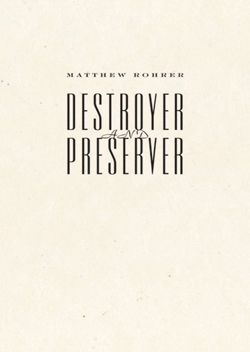
Destroyer and Preserver
by Matthew Rohrer
Wave Books, $16 (paper)
Matthew Rohrer invokes Shelley’s “Ode to the West Wind” in the title of his latest collection, in part because both he and Shelley, in Rohrer’s words, “love / the world and hate its face.” He also invokes it to contrast his manner of expressing that love and hate—demotic, domestic, unselfconsciously relaxed—with the more strained tones of Shelley’s “trumpet of prophecy.” After all, Rohrer implies, the face of our world—marked by “pop-up advertisements,” the war on terrorism, and Burger Kings—cannot countenance “the oldest songs,” if only because those songs fail to reach us in our radical isolation, where we have no “sense of community,” “the town unravels / around [us],” and “the future / belongs to the ghosts / sweeping the sidewalks / with their wedding dresses.” The breakdown of community and communication is Rohrer’s central theme. Though raggedly honest in his hopelessness, the poet nonetheless strives, by technical means, to mend what is broken. He declines, for example, to punctuate his sentences, so that the meaning of one phrase is integrally inflected by its grammatically isolated neighbors. So strongly enjambed are his lines that each seems breathless in the activity of catching up, in all senses of the phrase. Though Rohrer’s poems can sometimes be trite (“my vote doesn’t actually count”) or counterproductively muted by the overflow of his own feelings (“I just feel good”), his choicest songs uniquely navigate the competing commitments of solitude and community and enact the difficulties and pleasures of creating home in oneself and in the world.








